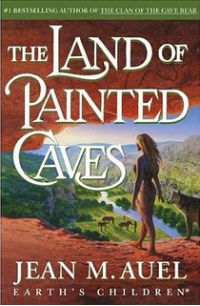Book of the Week: "The Land of Painted Caves"

There might be no nerdier guilty pleasure than the Earth's Children series by Jean Auel.* It’s chick lit for the Carl Sagan lover’s soul. And finally, almost exactly 31 years after introducing us to an orphaned 5-year-old Cro-Magnon girl in Clan of the Cave Bear , Auel concludes the six-book series with The Land of Painted Caves .
Ayla, our heroine, was raised by Neanderthals and, upon being cast out by them, tamed wild animals, revolutionized both Ice Age medicine and fire-starting technology, freed a tribe from a tyranical leader, crossed a continent, and, along the way, fell in love, found a mate, and had a kid. Now an adult, Ayla faces her greatest challenge yet: working motherhood! The ages-old question really is ages old: Can a woman have it all?
As Painted Caves opens, Ayla and her mate, Jondalar, are now settled back into his home cave in what today is France and have had a daughter. Ayla is training to be a Zelandonii-a healer and shaman-to her new people. But the constant demands on Ayla’s time put a strain on her relationship and take her away from her child, while her colleagues and friends wonder privately if she can take on such an important job while having a family.
Anyone familiar with these books knows the negatives: The dialogue is didactic, and the repetition is monotonous. (And for those who read for the naughty bits, alas, Ayla and Jondalar have become an old married couple.) The book won’t get many great reviews. But for fans, that won’t matter. What keeps people coming back are not only Auel’s compelling characters, who feel like old friends after this many books, but her painstaking research, which allows her to describe the everyday lives of our ancestors as if she owned a time machine. And in this book, Auel, through Ayla, takes us on a journey through many of Europe’s famous prehistoric painted caves, including Lascaux.
What kept me reading eagerly was the contrast between the very modern quandary that Auel imposed on Ayla-how to have a career and family-and the very real dangers that faced humans 35,000 years ago. We can sit around worrying about whether our children are over- or under-parented, whether enough women are CEOs and partners at law firms. Meanwhile, if our Cro-Magnon sisters wanted to visit the neighbors, they had to carry two days of food and a tent on their backs, and try to protect their children from lions and wolverines on the way. Life was precarious, and it was hard work. It all provides a refreshing perspective. (One can also detect a nascent …not skepticism, necessarily, but suspicion, of organized religion, as Ayla observes her fellow spiritual leaders and learns their ways.)
The book is enjoyable, though not nearly as gripping as the earlier book in the series. ( The Valley of Horses is probably my favorite, followed by The Mammoth Hunters . Or maybe it’s the other way around.) Still, the climax felt contrived and the ending sudden and incomplete. It felt as if Auel, even after all this time, wasn’t quite sure how to conclude her time with Ayla. Maybe the author is confronting her own ages-old parenting problem: empty-nest syndrome.
Correction, Apr. 22: This sentence originally referred to Auel's books as "the Earth Children's" series.

